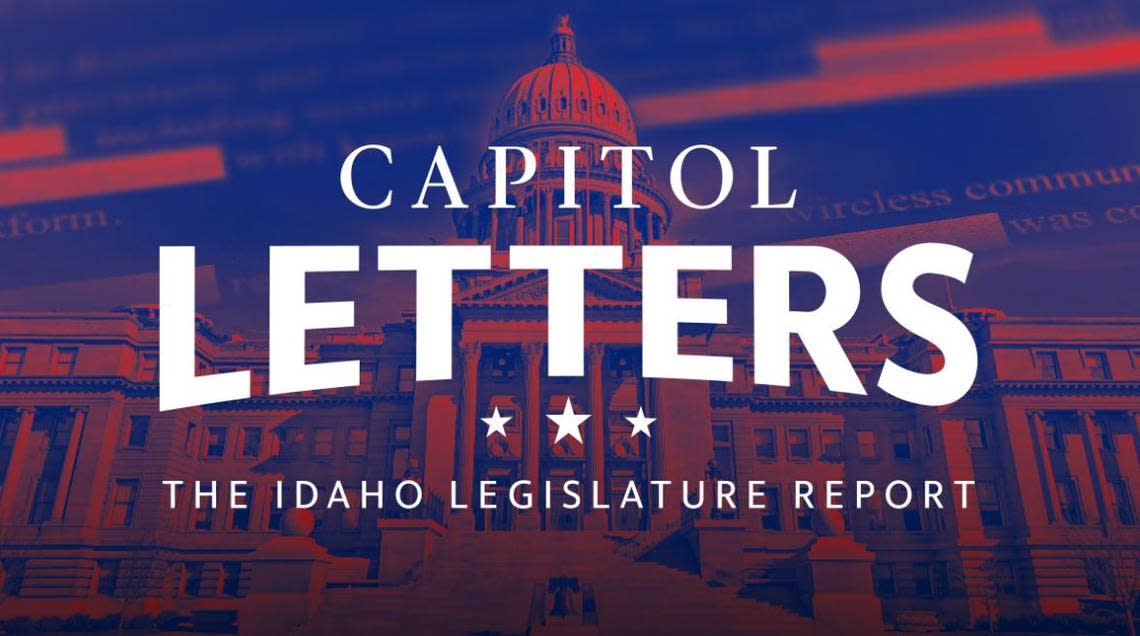Capitol Letters: House wants GOP-controlled council to oversee nonpartisan group

By Ryan Suppe, State Politics Reporter
A bill that would eliminate a bipartisan legislative committee cleared the Idaho House yesterday, despite concerns that the move would lead to partisan oversight of a nonpartisan research group.
The legislation would eliminate the Joint Legislative Oversight Committee, a committee with an equal number of Republicans and Democrats that oversees the Office of Performance Evaluations, a nonpartisan group that conducts research on the impact of state policies and programs.
Instead, the Legislative Council, a joint committee controlled by Republicans, would oversee the Office of Performance Evaluations.
The Legislative Council includes six lawmakers from each party elected by their colleagues. The Senate president pro tem and House speaker also sit on the council, giving an edge to Republicans, who hold supermajorities in both chambers. Joint oversight committee members, on the other hand, are appointed by leaders from each party.
“This streamlines the process. We’re getting rid of the middleman,” said House Majority Leader Megan Blanksma, R-Hammett, who is sponsoring the bill. “What this is about is changing the administration so that it’s more reflective of what this body looks like.”
Read my full story here.
New bills target hospitals’ tax exemptions
A new bill would allow county commissioners to eliminate property tax exemptions for hospitals.
Freshman Rep. Josh Tanner, R-Eagle, yesterday introduced two new bills dealing with hospitals’ tax-exempt status. One would give county governments the authority to compel hospitals to pay property taxes.
“This would allow the county commissioners to make the decision on what they see fit,” Tanner told the House Revenue and Taxation Committee. “Really, it should be up to them to make that decision.”
Tanner introduced a second bill that would eliminate state code granting property tax exemptions for hospitals’ satellite facilities, such as legal and marketing offices. Removing hospitals’ exemptions would help lower taxes for residential property taxpayers, he said.
Tanner’s Republican colleagues appeared skeptical about the potential effect on hospitals. Rep. Kenny Wroten, R-Nampa, wondered whether the additional expense would be passed down to patients and whether it might lead to “health care deserts” if some counties are friendlier to hospitals than others.
Rep. Stephanie Mickelsen, R-Idaho Falls, worried the additional tax burden might lead to rural hospitals closing.
“We have two or three rural hospitals on my side of the state that could possibly go out of business if they had additional property tax burdens,” Mickelsen said.
Opinion: Data centers and urban renewal
By Scott McIntosh, opinion editor
A bad bill making its way through the Idaho House appears to be based on a gross misunderstanding of how Idaho’s urban renewal districts work. And, if passed, it could spell the demise of an urban renewal district in Kuna meant to create a massive industrial park that includes a Meta data center.
The bill, House Bill 46, received approval from House Local Government Committee members, who seemed confused about the bill and misunderstood how taxes are paid under an urban renewal district. The bill conflates two separate issues — a sales tax exemption for a specific business category and urban renewal districts.
Read the full column on the legislation here.
What to expect today
8 a.m. Joint Finance-Appropriations. Lawmakers will discuss the Department of Environmental Quality’s budget.
8 a.m. Senate State Affairs. Legislators plan to introduce legislation amending Idaho code on open meetings, city elections and legal challenges to state law.
9 a.m. House Health and Welfare. Rep. John Vander Woude will introduce legislation on repealing the Medicaid expansion. The House Health and Welfare Committee, which Vander Woude chairs, recommended that Idaho continue providing the benefits.
9 a.m. House State Affairs. Lawmakers will hold a public hearing on House Bill 54, which would bar voters from using student IDs for personal identification at the polls. It would also eliminate personal affidavits voters can sign if they’re missing their IDs.
Find the full list of committee meetings and agendas for the House here, and for the Senate here.
If you like this newsletter, forward to a friend or colleague, and they can sign up here.
